Who makes better candidates — moms or dads? And more broadly, what impact do both the gender and parenting status of candidates have on their chances to win an election? An experimental survey by the Pew Research Center suggests that the answer depends, in no small part, on whether you are a Republican or a Democrat.
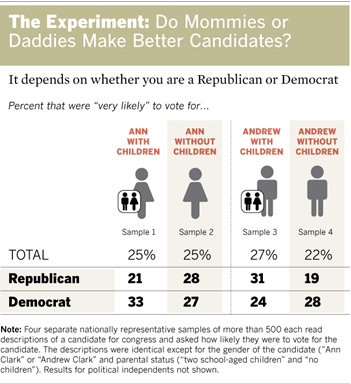
The Pew experiment was conducted earlier this summer, before the selection of Alaska Gov. Sarah Palin as the Republican vice-presidential candidate scrambled much of the conventional political wisdom about who’s on which side of the decades-old “Mommy Wars” over the competing demands of career and motherhood.
The online test was designed to give respondents no indication that it was about gender or parenting status. It found that Republicans are significantly less likely to vote for a candidate who is a mother of young children than one who is a father of young children, other factors being equal. Barely one-in-five (21%) Republicans said they were very likely to support a candidate for U.S. Congress who was the mother of school-aged children, while 31% said they would support a father who had the identical personal and career profile.
In addition, GOP partisans were 7 percentage points more likely to support a woman who has no children than to support a woman who is the mother of two young children (28% vs. 21%), though this difference fell just short of being statistically significant.
Among Democrats, gender and parenthood had the opposite effect: Democrats were significantly more likely to vote for a candidate for Congress who is the mother of small children than to support an identical candidate who is the father of small children (33% vs. 24%). Democratic women in particular more strongly supported Ann the mother than Andrew the father (36% vs. 19%). Among Democratic men, neither gender nor parenthood made a difference.
Taken together, the findings suggest women with young children pay a “mommy penalty” among Republicans if they run for Congress. Among Democrats, by contrast, it’s the fathers of small children who are at a disadvantage and it’s the mothers who are more likely to be strongly supported.
These results echo the findings of other Pew surveys which show that Republicans — who are more likely to embrace traditional social values — are far more troubled than Democrats by the long term trend toward mothers of young children working outside the home. In a 2007 survey, for example, some 53% of Republicans described this trend as bad for society, compared with just 38% of Democrats who felt the same way.
But these surveys were conducted before the dramatic entrance onto the national scene of Palin, who suddenly has become the most famous working mom in the country. The enthusiastic initial response to her candidacy — especially among Republicans and among women — raises an intriguing political question for the fall campaign: might the public’s long held attitudes on these “mommy wars” matters bend under the force of Palin’s compelling personal saga?
The Experiment
In the experimental Pew Research Center survey conducted from mid June to mid July, four separate random samples of more than 500 registered voters each — a total of 2,300 voters overall — were asked to read an online profile of a hypothetical candidate for U.S. Congress in their district.1 The profiles all described the candidate as a lawyer, first-time candidate, a churchgoer, a member of the local Chamber of Commerce, an environmentalist, a volunteer at a local homeless shelter and a member of the same party as the survey respondent. Respondents in each sample were then asked to indicate what they liked and didn’t like about the candidate, whether they considered the candidate qualified and whether they were inclined to vote for the candidate. There was no indication that this was a survey about possible hidden bias against women or mothers.
The profiles differed in two important ways. In one of the samples of respondents, the candidate was identified as “Ann Clark” and also described her as the mother of two “school-aged children”. In a second sample, Ann Clark was described as married with no children. In a third sample group of respondents, the candidate was a man, “Andrew Clark”, who was identified as the married father of two school-aged children. In the fourth sample group, candidate Andrew Clark was described as married with no children. In that way, the experiment could test whether being a man, a woman or a parent affects attitudes toward candidates who were identical in every other respect.
To measure voting preferences, respondents were asked how likely they were to vote for the described candidate on a 10-point scale that ranged from 1 (“definitely would not vote for candidate”) to 10 (“definitely would vote for candidate”). Those who answered 10, 9 or 8 were classified as “very likely” to vote for the candidate.
Few Overall Differences
In the test, Ann Clark and Andrew Clark got about the same number of “votes” from their respective samples; regardless of whether they were identified as being the mother or father of school-aged children.
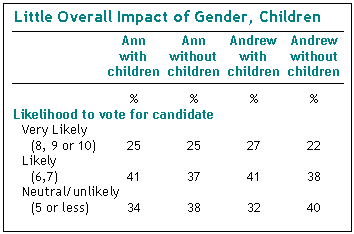
Voters were as likely to strongly support Ann the mother (25%) and Andrew the father (27%) as they were as they were to strongly support a childless Ann (25%) or Andrew (22%). One significant difference did emerge: a larger proportion of voters expressed neutral or negative views (5 or less on the 10-point scale) about supporting a childless Andrew than had these same feelings about Andrew the father (40% vs. 32%).
Results from other questions produced generally complementary findings. No statistically significant differences emerged when respondents were asked their overall impression of the candidates. More than a third of voters had a very favorable view of Ann the mother or Andrew the father (10, 9 or 8 on a 10-point scale that ran from “very favorable” to “very unfavorable”). And a roughly similar proportion of voters have a positive impression of a childless Ann (32%) or Andrew (31%). Similarly, voters offered about the same overall evaluation of the candidate’s qualifications for Congress regardless of whether they were read a description of Ann the mother (26% rated her as very qualified), a childless Ann (23%) or Andrew (25%), though the difference between views of Andrew the father (30%) and the childless Ann were significant.
One other interesting pattern emerges from these data, though its significance is unclear. A childless Andrew was generally viewed less positively across all three measures. These differences fell short of achieving statistical significance, though the persistence of this pattern suggests that some small but potentially important differences may exist.
A Deeper Look: Party Matters
The absence of overall differences is deceptive — the product of equal but opposing strains of public opinion that run though key political and demographic subgroups.
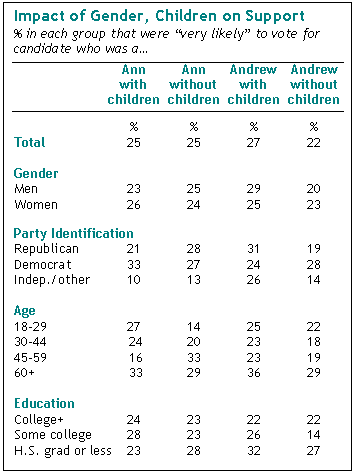
Notably, gender and parenthood tug in exactly opposite directions within the two major parties***. More Republicans said they would be very likely to vote for Andrew the father than Ann the mother (31% vs. 20%)2, all other factors being equal. Republicans also were more likely to support the hypothetical Andrew if he were a father than if he did not have children (31% vs. 19%) — a result largely driven by Republican men, who were nearly three times more likely to strongly endorse Andrew the father than the childless Andrew (36% vs. 13%).
Democrats, however, were significantly more likely to say they would likely vote for Ann the mother than Andrew the father (34% vs. 24%). The pattern among those who said they were independents was similarly striking. These voters were more likely to say they would strongly support Andrew the father over Ann, irrespective of whether she had children (26% for Andrew the father vs. 10% for Ann the mother and 13% for the childless Ann). Independents also were more likely to support a father over a male candidate with no children (26% vs.14%), though this result falls just short of being statistically significant due to the relatively small number of independents in the study.
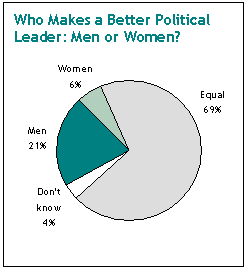
Other Demographic Differences
Overall, the results from the experiment suggest that gender and parental status matter more for men than for women. Male voters prefer Andrew the father (29%) to a childless Andrew (20%). But female voters are largely unaffected by either a candidate’s gender or parental status. Regardless of whether the candidate was an Andrew or an Ann, or whether they had two small children or none, about a quarter of women said they would be strongly inclined to vote for the candidate, all other factors being equal. Some differences by age also emerged from the test. Young people were significantly less inclined to support a childless Ann than either a man or woman with children at home. And fully a third of all those between the ages of 45 to 59 were more apt to support Ann if she did not have children than Ann the mother or a childless Andrew. Also, voters who had attended college but did not graduate were significantly less likely to back a male candidate without small children (14%) than a woman or man with young children (28% and 26%, respectively).
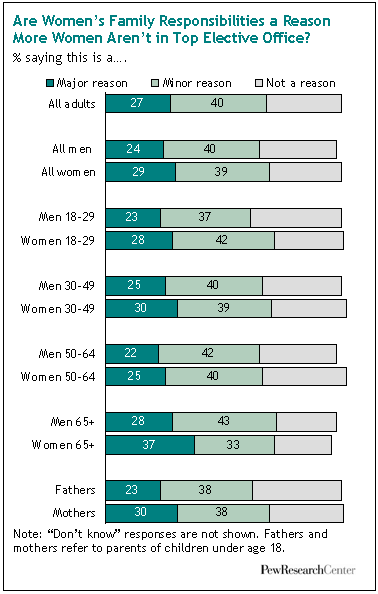
Gender and Politics: What Other Pew Surveys Have Found
The candidacies in 2008 of Palin and Sen. Hillary Clinton have brought to center stage longstanding and wide-ranging cultural debates about the role of women in modern society. In addition to this online survey experiment, the Pew Research Center conducted nationwide surveys in 2008, 2007 and 2005 that explored public attitudes on matters related to gender, power, motherhood, work and family. Among the findings:
Women and Leadership
- The public rates women better than men on honesty, intelligence and a handful of other traits it highly values in leaders, yet just 6% of adults say that, overall, women make better political leaders than men. About one in five (21%) say women make better leaders, while the vast majority (69%) say men and women make equally good leaders.
- Asked why there are not more women in top political offices, the public is most inclined to cite public unreadiness (51% say this is a major reason); a self-serving old boys network (43%); and gender discrimination (38%). A smaller share of the public (27%) cites women’s responsibilities to their families as a major obstacle.
- Women (29%) are slightly more likely than men (24%) to say that the family responsibilities are a major reason there aren’t more women in high office. Women are also a bit more likely to cite this as an obstacle now than they were in surveys taken both in 1999 and 1989 when just 23% of women felt this way.3
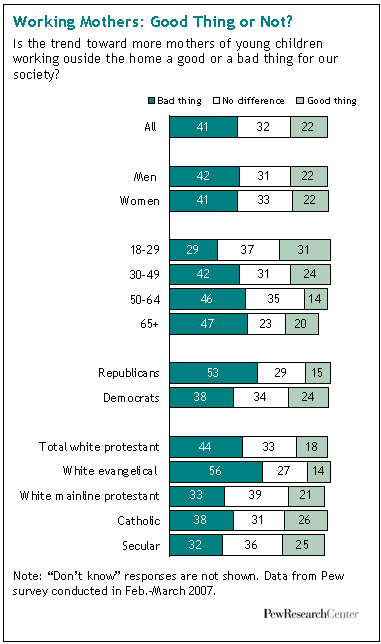
Working Mothers
- By a ratio of about two-to-one, the public says the trend toward more mothers of young children working outside the home is a bad thing for society (41%) rather than a good thing (22%), with the remainder saying it makes no difference. Men and women have nearly identical views on this question. But there is a big gap between Republicans and Democrats: some 53% of Republicans say this is a bad thing, compared with just 38% of Democrats.
- In the past decade, full-time work outside the home has lost some of its appeal to mothers. Among working mothers with minor children, just one-in-five in 2007 said full-time work is the ideal situation for them, down from the 32% who said this in 1997. Among at-home mothers, just 16% say their ideal situation would be to work outside the home, down from 24% who felt this way in 1997.
- Mothers who work full-time outside the home give themselves lower ratings as parents, on average, than do at-home mothers or mothers who work part time. On a self-rating scale of zero to ten, 28% of full-time working moms give themselves a score of 9 or 10. By contrast, 41% of mothers who are employed part-time and 43% of at-home mothers give themselves one of these two top scores for their performance as parents.
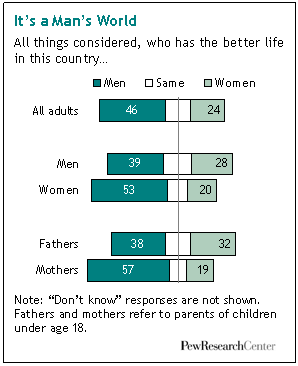
Mothers, Fathers, Stress, Discrimination
- The 2008 gender survey found that mothers (85%) are more likely than fathers (74%) to say they sometimes or frequently are under stress. Parents of minor children are more likely to report stress than are women overall (77%) and men overall (68%). In addition, more than a third of mothers of minor children (36%) said in 2005 they “always feel rushed.” By contrast, only a quarter of fathers of minor children (25%) or less than a quarter of all adults (23%) said they always feel rushed.
- Mothers of children under the age of 18 are much more likely to say that men (57%), not women (19%) have the better life in this country. Fathers of minor children, on the other hand, split their votes more evenly between men (38%) and women (32%) having the better life. Mothers are somewhat more likely than all women to say that men have it best; fathers tilt less toward men having the better life than all men do.
- This difference also plays out when parents are asked about gender discrimination: A notably higher share of mothers (61%) than fathers (44%) of children under 18 say that discrimination against women is a serious problem. Fathers are somewhat more likely than men overall to say that sex discrimination is not a serious problem—more than half (53%) do.




